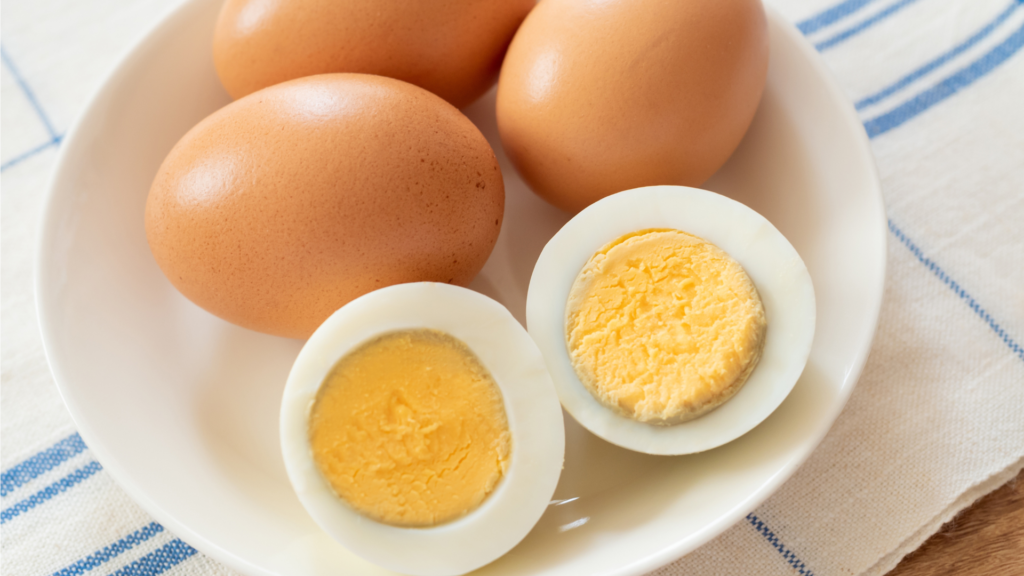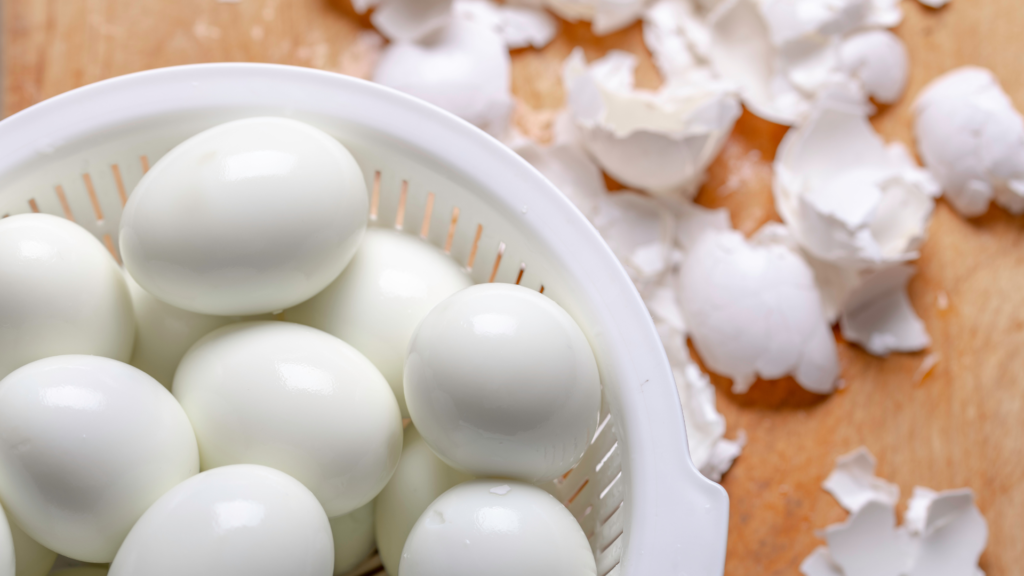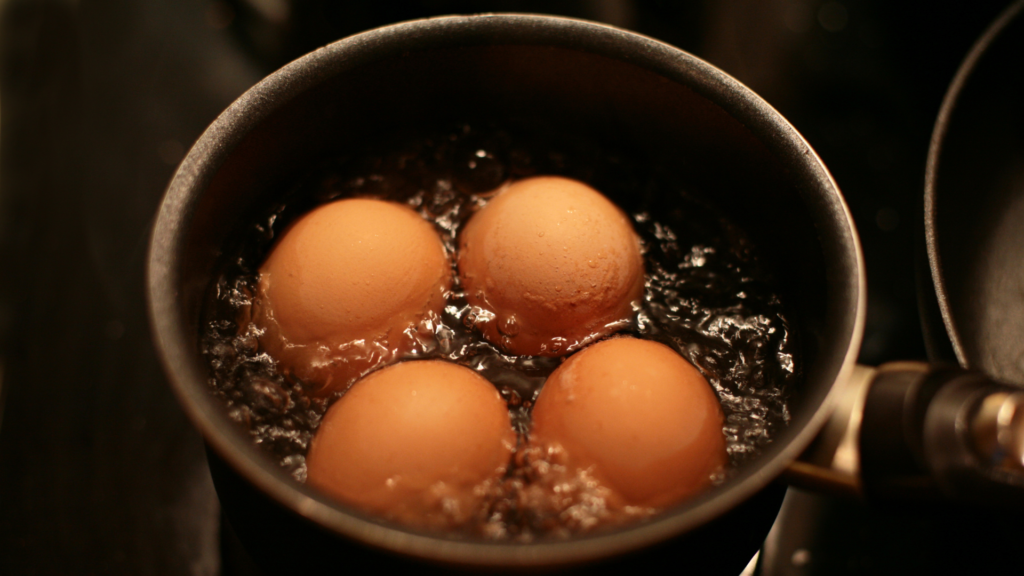Image Source: learncleanup.com
Are you a fan of hard-boiled eggs, those delightful bundles of protein-packed goodness? It’s undeniable – they’re like compact energy bundles encased in a shell. Not only are they versatile, but they’re also incredibly convenient to have on hand. Who doesn’t appreciate having a stash of ready-to-eat eggs waiting in the fridge? I’m right there with you on this thrilling journey to maximize the longevity of our hard-boiled eggs.
Imagine this scenario: you’re all set to whip up some delicious egg salad or a mouthwatering cobb salad, and you reach for those hard-boiled eggs in your fridge. But pause for a moment – how long have they been chilling there? What’s the window of time before they begin to lose their freshness? I pondered these questions myself, delving into research to uncover the facts, and now I’m here to share my discoveries with you.
 Image Source: learncleanup.com
Image Source: learncleanup.com
As per insights from Herve Malivert, the culinary expert at the Institute of Culinary Education, hard-boiled eggs boast a surprisingly decent shelf life of three to four days in the fridge. Yes, you read that correctly – you’ve got several days to relish those egg-cellent creations. But wait, there’s more! If you’re keen on extending their freshness even further, here’s a clever tip: store your eggs upside-down. It may sound unconventional, but it helps maintain the yolk’s center and prevents the formation of that unappealing greenish ring. It’s a win-win situation, wouldn’t you agree?
Now, onto another piece of advice: if you’ve already peeled your hard-boiled eggs, it’s advisable to consume them within a day or two. Why, you ask? Well, once peeled, they tend to lose moisture more rapidly. And let’s be honest – there’s something immensely satisfying about peeling a perfectly cooked egg, isn’t there? So, if you plan to store them for more than a couple of days, keep those shells intact.
But let’s address the elephant in the room – how can you discern if your hard-boiled eggs have gone bad? It’s remarkably simple. If they emit an unpleasant odor, if the egg whites appear slimy or discolored, or if the yolks are dry and crumbly, it’s time to bid them farewell. Trust your instincts, and you won’t go wrong.
The culinary possibilities with hard-boiled eggs are boundless! From timeless deviled eggs to satisfying egg salad sandwiches, and even as a protein-rich addition to your salads – these versatile gems can elevate any dish. However, here’s a word of caution: while the temptation to freeze them may arise, it’s best to resist. Freezing hard-boiled eggs can alter their texture, rendering them tough and rubbery upon thawing. Let’s prioritize keeping our eggs in prime condition, shall we?
Before we conclude this egg-citing adventure, here’s a final nugget of wisdom: refrain from storing your eggs in the fridge door. Despite its convenience, the door is subjected to frequent temperature fluctuations, making it the warmest part of the refrigerator. Your precious eggs deserve better treatment, so nestle them in a cozy corner on a shelf instead.
In essence, you now possess the tools to maximize the potential of your hard-boiled eggs. From preserving their freshness to crafting delightful culinary creations, these little marvels are invaluable companions in the kitchen. So, go forth with confidence and whip up those egg-cellent dishes. Your taste buds are in for a treat!

Image Source: learncleanup.com
Are you a fellow enthusiast when it comes to hard-boiled eggs? It’s undeniable – they’re like compact energy bundles encased in a shell. Not only are they versatile, but they’re also incredibly convenient to have on hand. Who doesn’t appreciate having a stash of ready-to-eat eggs waiting in the fridge? I’m right there with you on this thrilling journey to maximize the longevity of our hard-boiled eggs.
Imagine this scenario: you’re all set to whip up some delicious egg salad or a mouthwatering cobb salad, and you reach for those hard-boiled eggs in your fridge. But pause for a moment – how long have they been chilling there? What’s the window of time before they begin to lose their freshness? I pondered these questions myself, delving into research to uncover the facts, and now I’m here to share my discoveries with you.
As per insights from Herve Malivert, the culinary expert at the Institute of Culinary Education, hard-boiled eggs boast a surprisingly decent shelf life of three to four days in the fridge. Yes, you read that correctly – you’ve got several days to relish those egg-cellent creations. But wait, there’s more! If you’re keen on extending their freshness even further, here’s a clever tip: store your eggs upside-down. It may sound unconventional, but it helps maintain the yolk’s center and prevents the formation of that unappealing greenish ring. It’s a win-win situation, wouldn’t you agree?
Now, onto another piece of advice: if you’ve already peeled your hard-boiled eggs, it’s advisable to consume them within a day or two. Why, you ask? Well, once peeled, they tend to lose moisture more rapidly. And let’s be honest – there’s something immensely satisfying about peeling a perfectly cooked egg, isn’t there? So, if you plan to store them for more than a couple of days, keep those shells intact.
But let’s address the elephant in the room – how can you discern if your hard-boiled eggs have gone bad? It’s remarkably simple. If they emit an unpleasant odor, if the egg whites appear slimy or discolored, or if the yolks are dry and crumbly, it’s time to bid them farewell. Trust your instincts, and you won’t go wrong.
The culinary possibilities with hard-boiled eggs are boundless! From timeless deviled eggs to satisfying egg salad sandwiches, and even as a protein-rich addition to your salads – these versatile gems can elevate any dish. However, here’s a word of caution: while the temptation to freeze them may arise, it’s best to resist. Freezing hard-boiled eggs can alter their texture, rendering them tough and rubbery upon thawing. Let’s prioritize keeping our eggs in prime condition, shall we?
Before we conclude this egg-citing adventure, here’s a final nugget of wisdom: refrain from storing your eggs in the fridge door. Despite its convenience, the door is subjected to frequent temperature fluctuations, making it the warmest part of the refrigerator. Your precious eggs deserve better treatment, so nestle them in a cozy corner on a shelf instead.
In essence, you now possess the tools to maximize the potential of your hard-boiled eggs. From preserving their freshness to crafting delightful culinary creations, these little marvels are invaluable companions in the kitchen. So, go forth with confidence and whip up those egg-cellent dishes. Your taste buds are in for a treat!

